详解intellij idea搭建SSM框架(spring+maven+mybatis+mysql+junit)(下)
在上一篇(详解intellij idea 搭建SSM框架(spring+maven+mybatis+mysql+junit)(上))博文中已经介绍了关于SSM框架的各种基础配置,(对于SSM配置不熟悉的朋友,可以先看看上一篇博文)那么本篇博文介绍介绍springmvc前后台的交互。
v简单页面跳转
我们首先修改index.jsp文件,实现一个页面跳转。
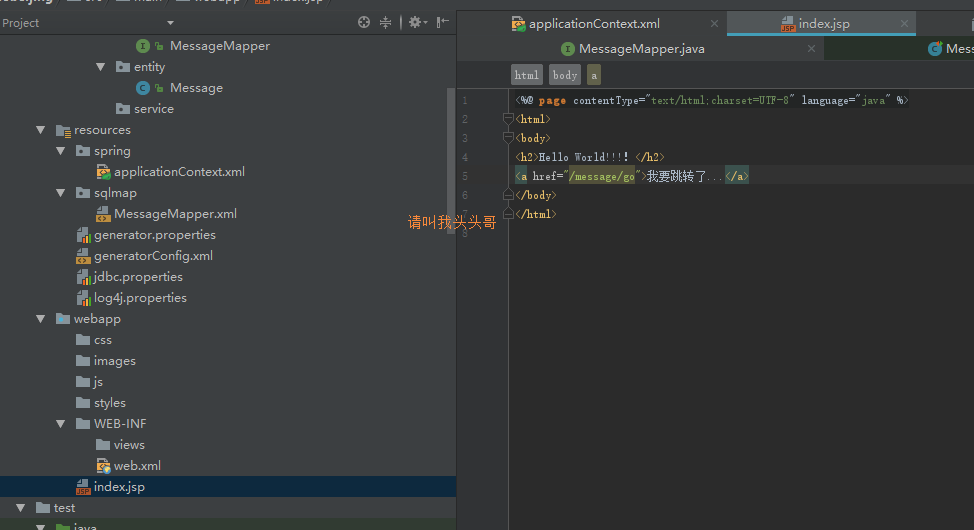
在views文件夹下面建一个jsp文件,就是上面所需要跳转的页面。
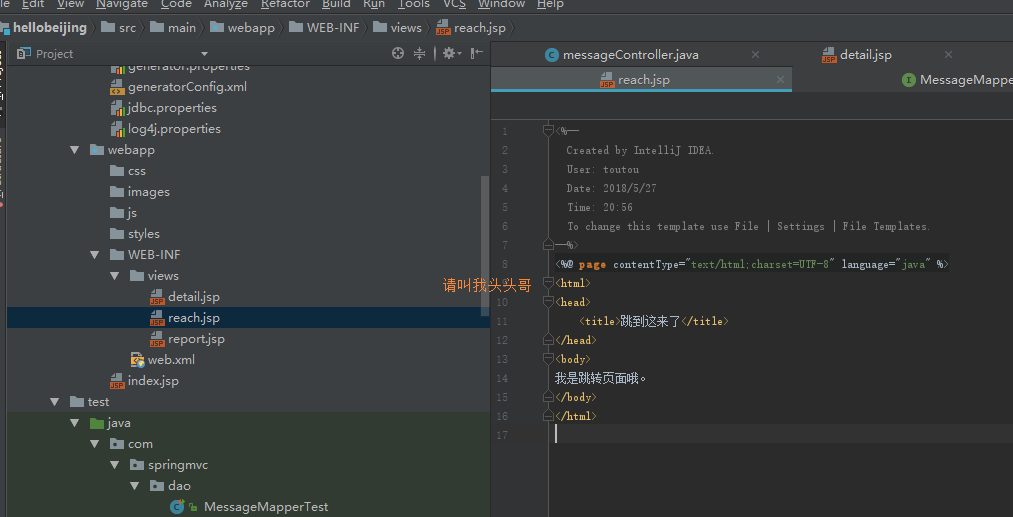
对应的实现页面跳转,完善这个功能,增加映射,可以处理对跳转中的/message/go作出响应,在controller包里面新建java文件,格式:Controller.java,以示他是用来控制请求的,这里新建文件messageController.java
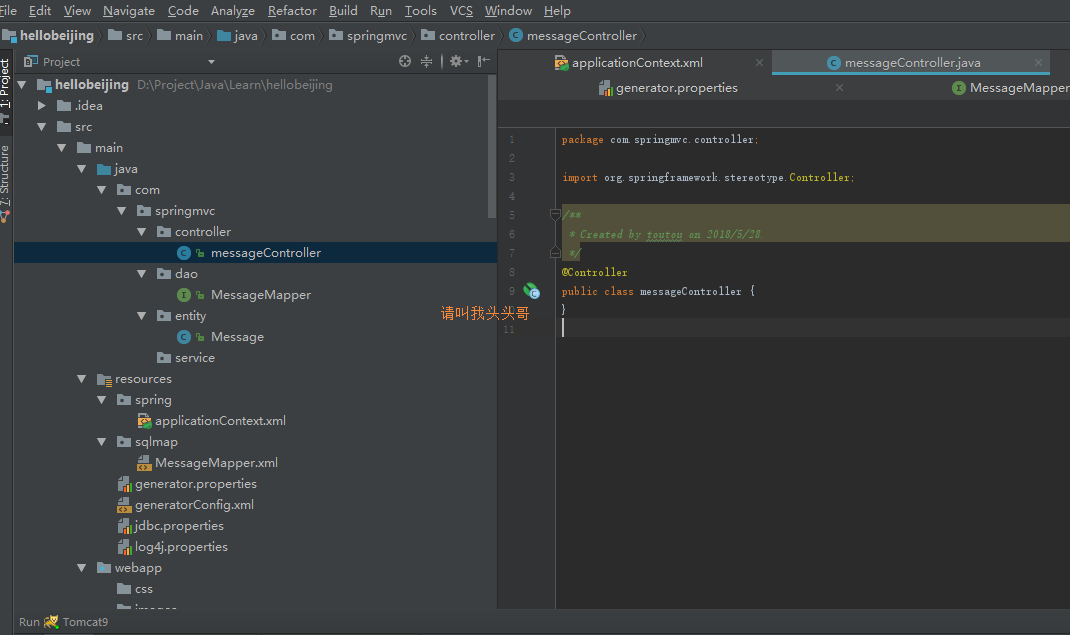
注意在开头加一个"@Controller",@Controller标识一个Spring类是Spring MVC controller处理器, 也就是加了@Controller,这个文件就会被spring认为是处理请求的
接着开始写函数,@RequestMapping() 里面写链接,@RequestMapping() 注解可以在控制器类的级别和/或其中的方法的级别上使用。

注意函数名称可以随便起,重要的是需要对应的url映射和返回的文件 。点击运行启动项目。效果如下图:
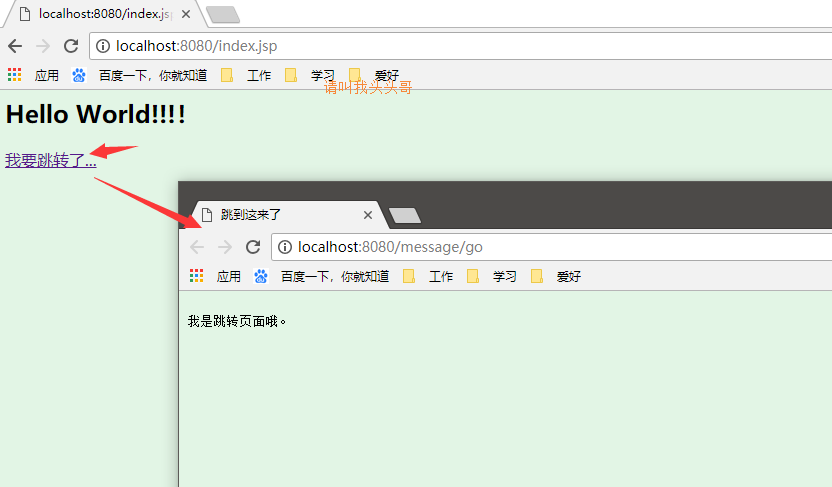
点击"我要跳转了...", 跳转至新建的jsp页面。OK,跳转页面的小目标就此实现。
v综合页面跳转
需求:在页面上输入一个用户名,然后根据这个用户名跳转到这个用户的详情页。
改造index.jsp, 增加可以输入用户名的框框。
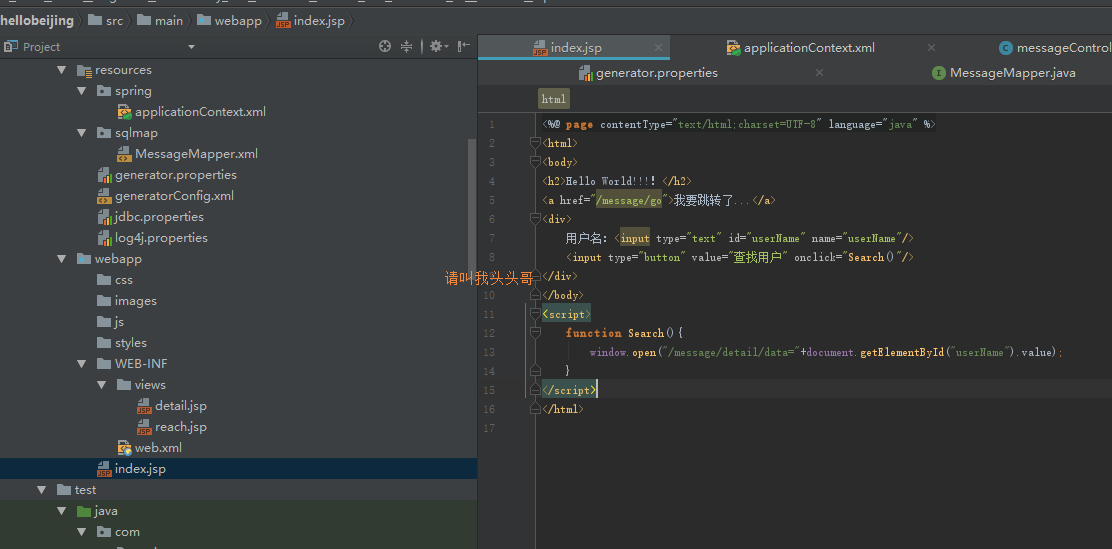
添加控制的跳转函数,
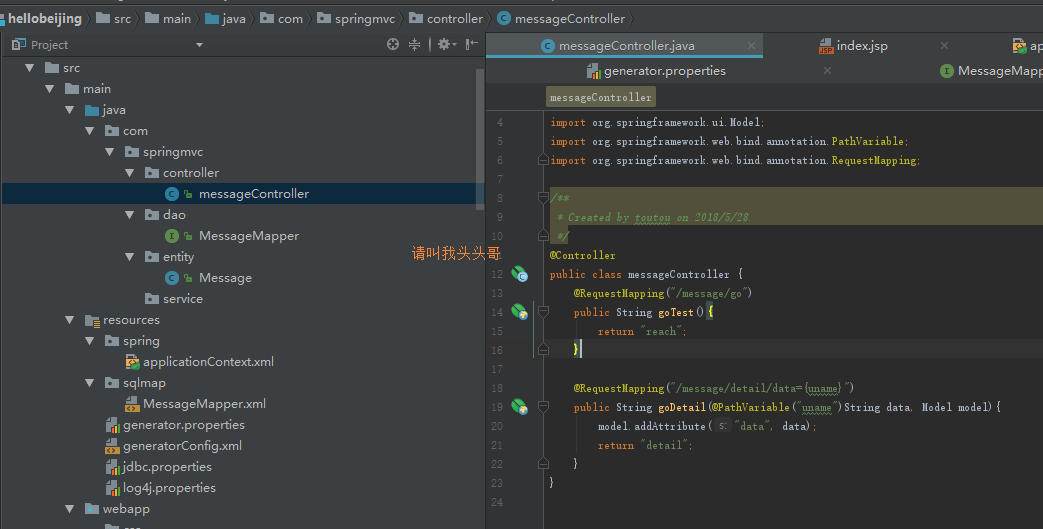
@PathVariable可以将 URL 中占位符参数绑定到控制器处理方法的入参中:URL 中的 {xxx} 占位符可以通过,@PathVariable("xxx") 绑定到操作方法的入参中。
新建用户详情页
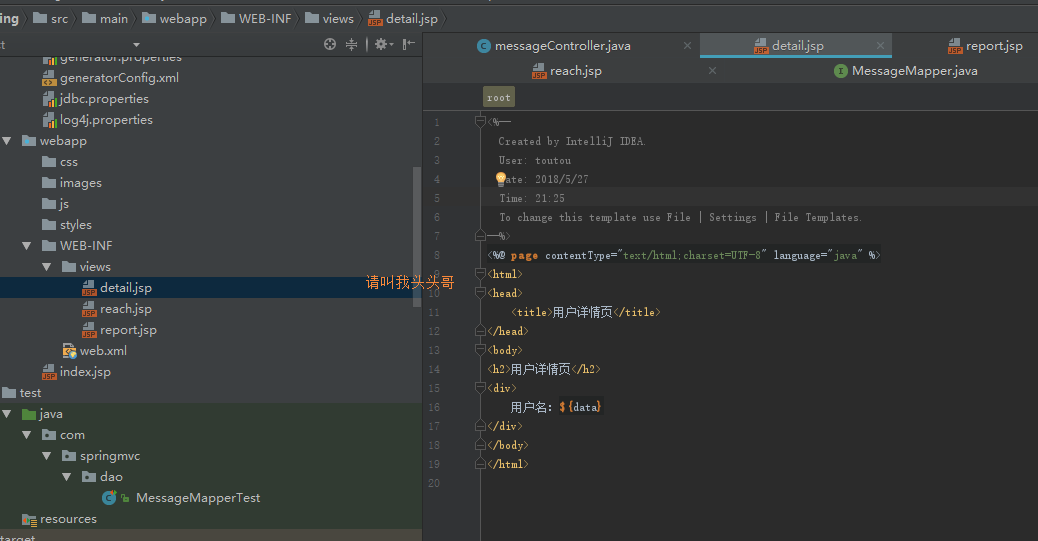
点击运行,实现效果如下:
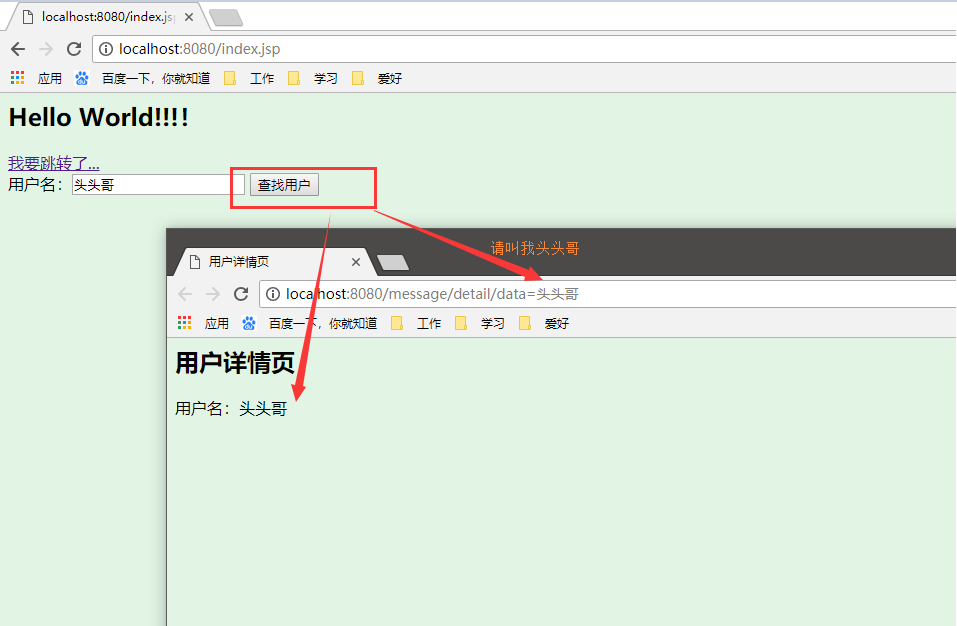
vform表单
1、GET请求会向数据库发索取数据的请求,从而来获取信息,该请求就像数据库的select操作一样,只是用来查询一下数据,不会修改、增加数据,不会影响资源的内容,即该请求不会产生副作用。无论进行多少次操作,结果都是一样的。
2、与GET不同的是,PUT请求是向服务器端发送数据的,从而改变信息,该请求就像数据库的update操作一样,用来修改数据的内容,但是不会增加数据的种类等,也就是说无论进行多少次PUT操作,其结果并没有不同。
3、POST请求同PUT请求类似,都是向服务器端发送数据的,但是该请求会改变数据的种类等资源,就像数据库的insert操作一样,会创建新的内容。几乎目前所有的提交操作都是用POST请求的。
4、DELETE请求顾名思义,就是用来删除某一个资源的,该请求就像数据库的delete操作。
在实际操作的时候,就get和post两种用的比较多。这里主要介绍get和post
GET
1.改造index.jsp,添加get方式的form表单
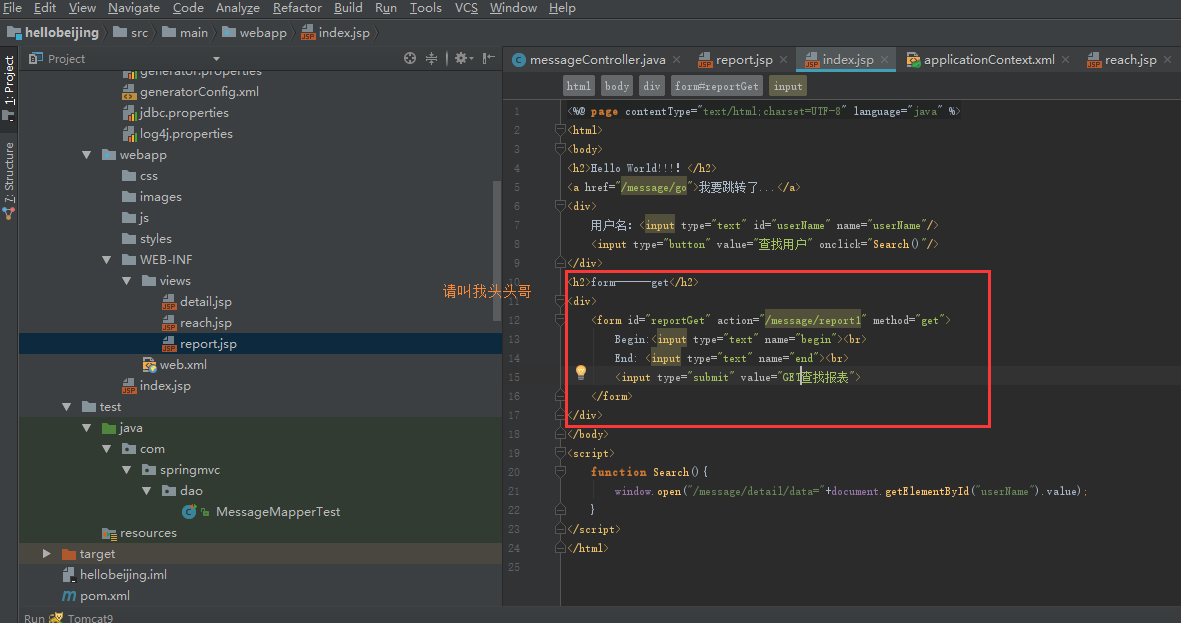
2.添加处理get请求的函数
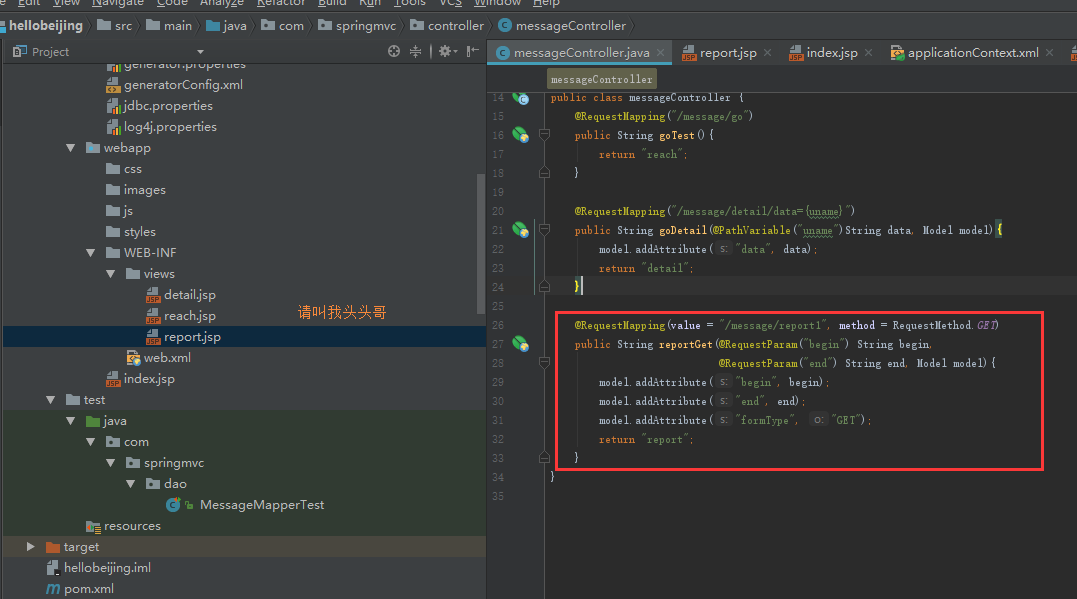
3.根据get请求最终展示数据的报表页
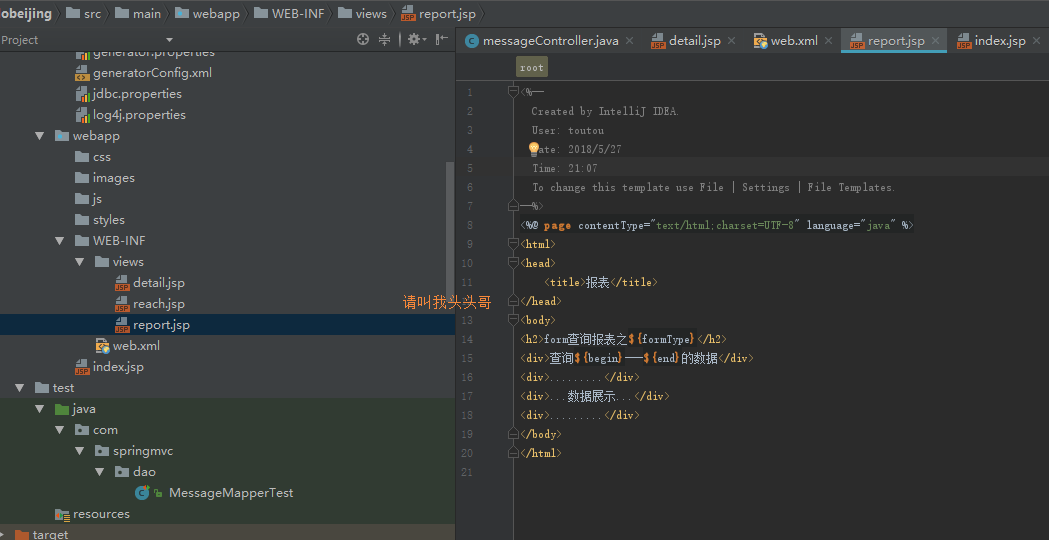
4.点击运行,效果如下:
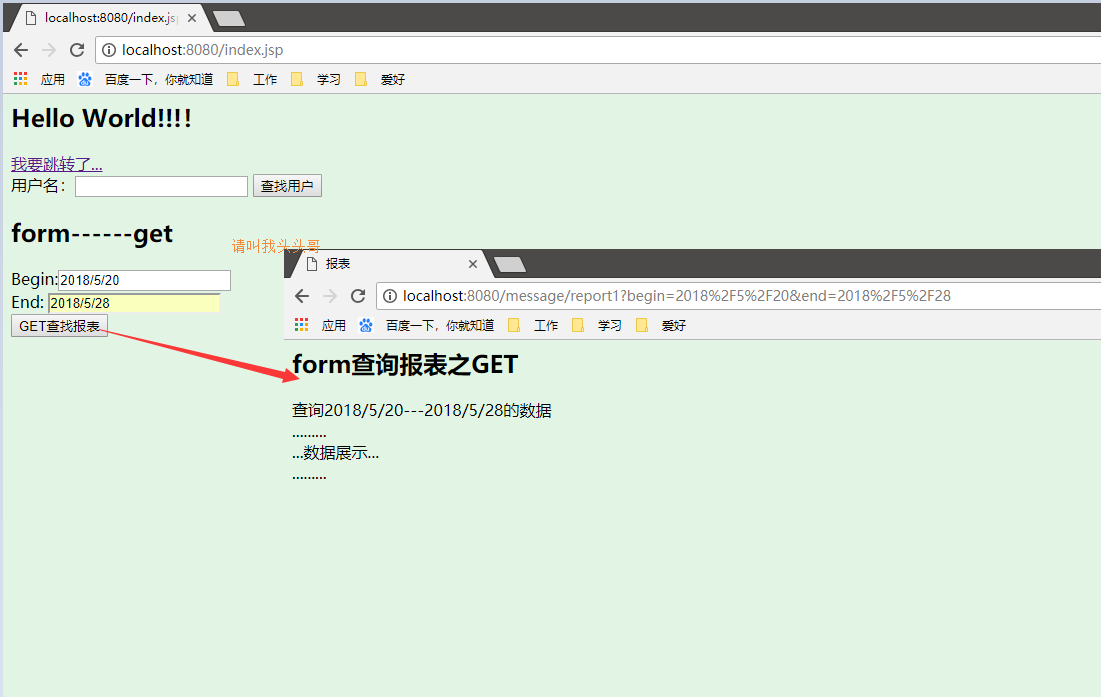
输入开始和结束时间,点击查找报表
POST
1.改造index.jsp,添加post方式的form表单
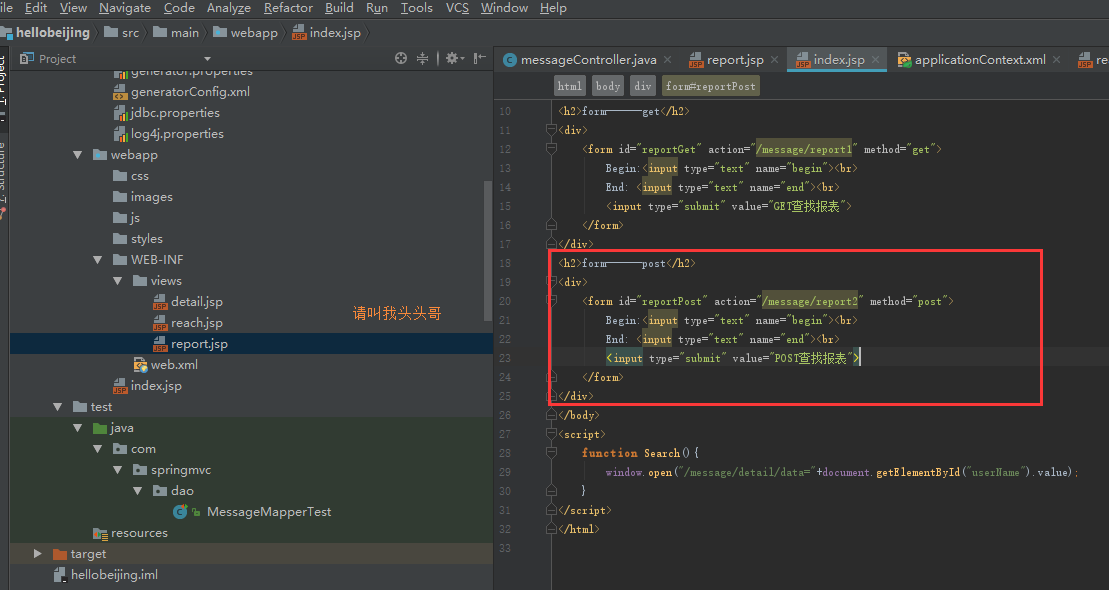
2.添加处理post请求的函数
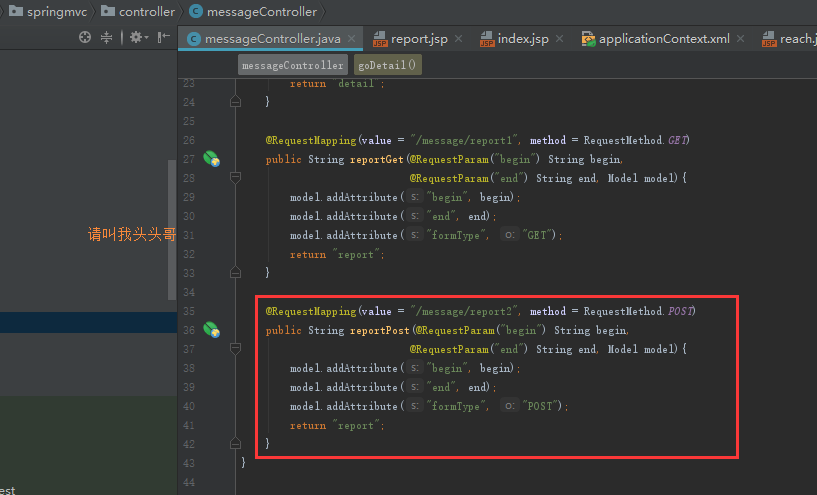
3.根据post请求最终展示数据的报表页
报表页共用GET方式的报表页。
4.点击运行,效果如下:
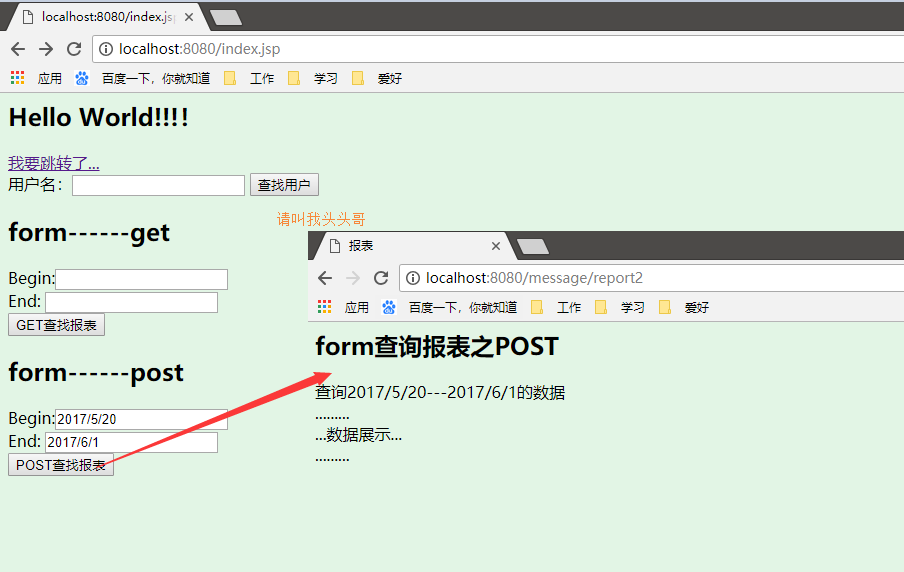
输入开始和结束时间,点击查找报表
v注册登录
大部分网站都绕不开登录和注册,那就来讲讲springmvc登录注册的简单实现。
首先创建一个用户表
再用mybatis-generator自动生成的实体类,UserInfo
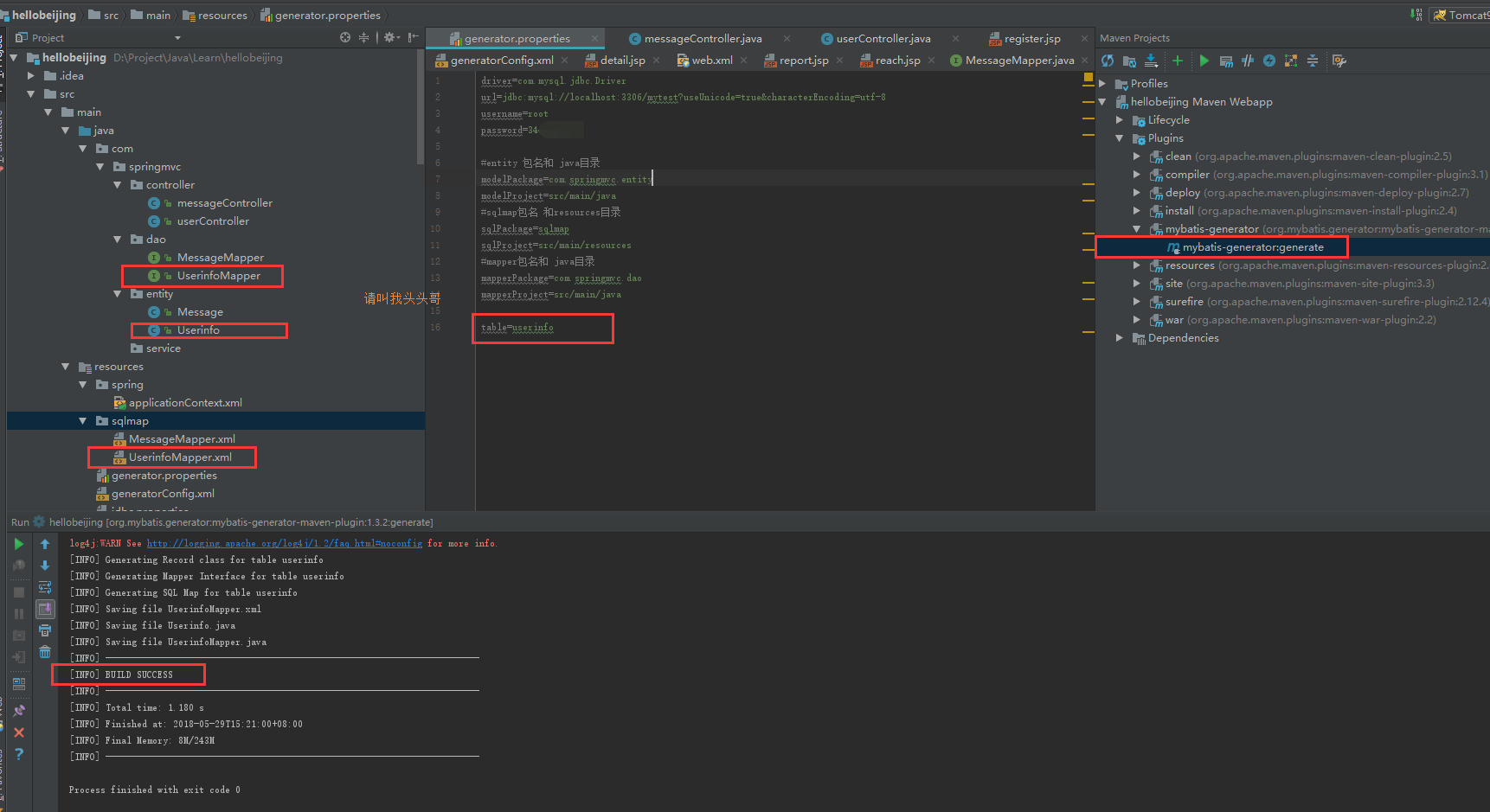
添加service层
UserinfoService

package com.springmvc.service; import com.springmvc.entity.Userinfo; import java.util.ArrayList; /** * Created by toutou on 2018/5/27. */ public interface UserinfoService { int insert(Userinfo record); ArrayList<Userinfo> selectSelective(Userinfo record); }
UserinfoServiceImpl
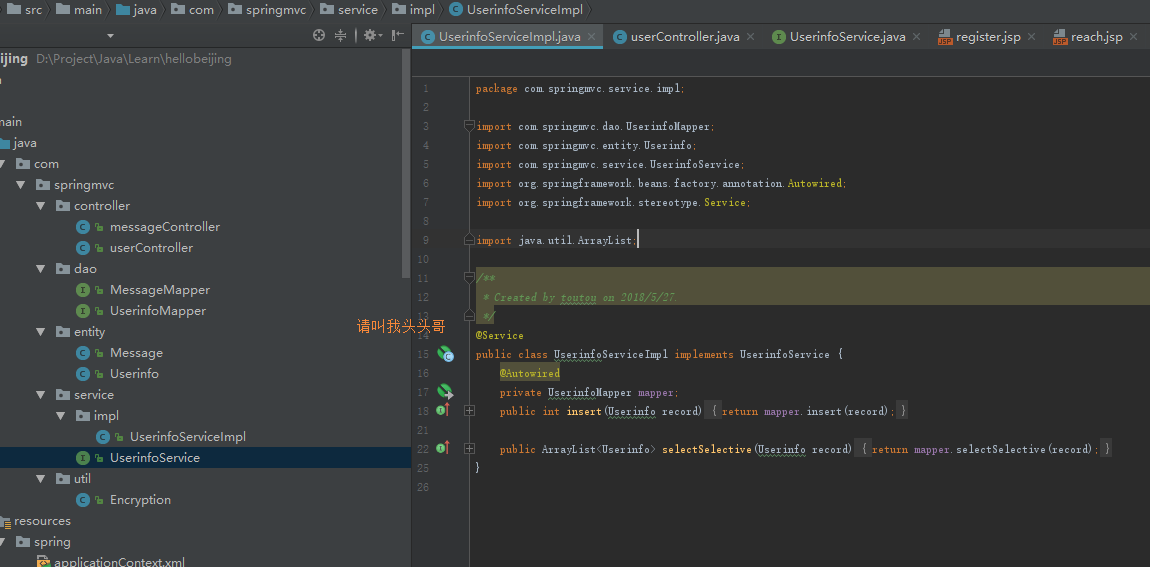
出于用户账号安全的考虑,一般用户密码都需要进行加密,这样只有用户自己知道自己的密码,采用MD5加密,附上方法。(简单的加密网上一搜一大堆,我这也是网上搜的)

package com.springmvc.util; import java.security.MessageDigest; /** * Created by toutou on 2018/5/27. */ public class Encryption { // MD5加码。32位 public static String MD5(String inStr) { MessageDigest md5 = null; try { md5 = MessageDigest.getInstance("MD5"); } catch (Exception e) { System.out.println(e.toString()); e.printStackTrace(); return ""; } char[] charArray = inStr.toCharArray(); byte[] byteArray = new byte[charArray.length]; for (int i = 0; i < charArray.length; i++) byteArray[i] = (byte) charArray[i]; byte[] md5Bytes = md5.digest(byteArray); StringBuffer hexValue = new StringBuffer(); for (int i = 0; i < md5Bytes.length; i++) { int val = ((int) md5Bytes[i]) & 0xff; if (val < 16) hexValue.append("0"); hexValue.append(Integer.toHexString(val)); } return hexValue.toString(); } // 可逆的加密算法 public static String KL(String inStr) { // String s = new String(inStr); char[] a = inStr.toCharArray(); for (int i = 0; i < a.length; i++) { a[i] = (char) (a[i] ^ 't'); } String s = new String(a); return s; } // 加密后解密 public static String JM(String inStr) { char[] a = inStr.toCharArray(); for (int i = 0; i < a.length; i++) { a[i] = (char) (a[i] ^ 't'); } String k = new String(a); return k; } /*// 测试主函数 public static void main(String args[]) { String s = new String("123123"); System.out.println("原始:" + s); System.out.println("MD5后:" + MD5(s)); System.out.println("MD5后再加密:" + KL(MD5(s))); System.out.println("解密为MD5后的:" + JM(KL(MD5(s)))); }*/ /** * 创建指定数量的随机字符串 * * @param numberFlag * 是否是数字 * @param length * @return */ public static String generateQC(boolean numberFlag, int length) { String retStr = ""; String strTable = numberFlag ? "1234567890" : "1234567890abcdefghijkmnpqrstuvwxyz"; int len = strTable.length(); boolean bDone = true; do { retStr = ""; int count = 0; for (int i = 0; i < length; i++) { double dblR = Math.random() * len; int intR = (int) Math.floor(dblR); char c = strTable.charAt(intR); if (('0' <= c) && (c <= '9')) { count++; } retStr += strTable.charAt(intR); } if (count >= 2) { bDone = false; } } while (bDone); return retStr; } }
注册
添加userController注册函数
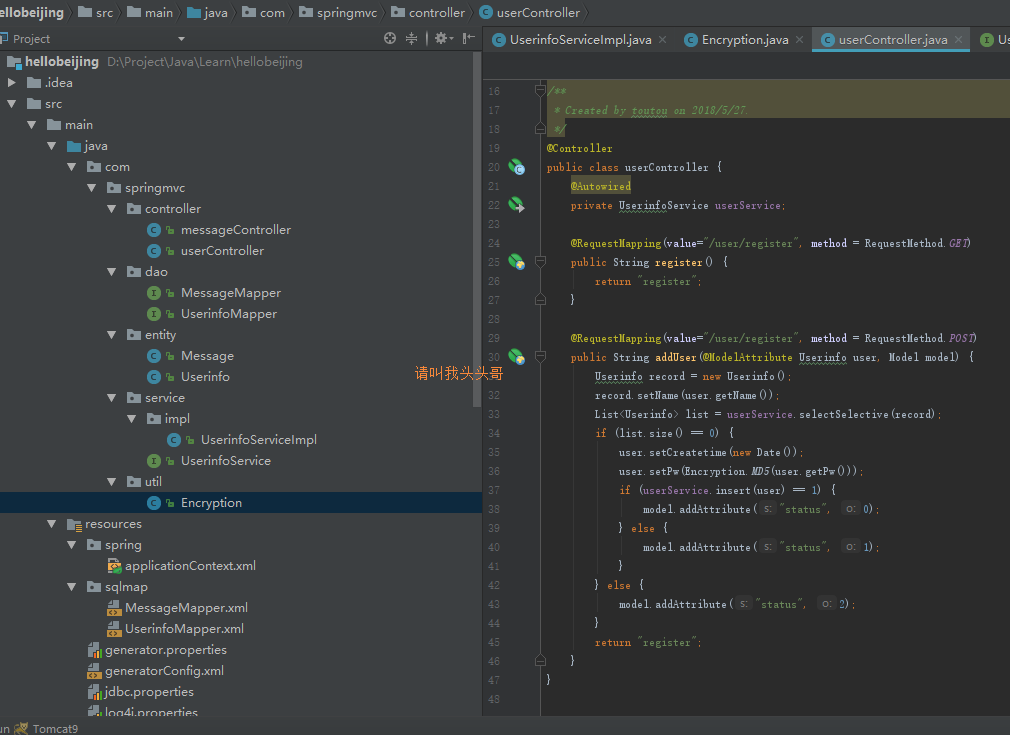
添加注册页面register.jsp
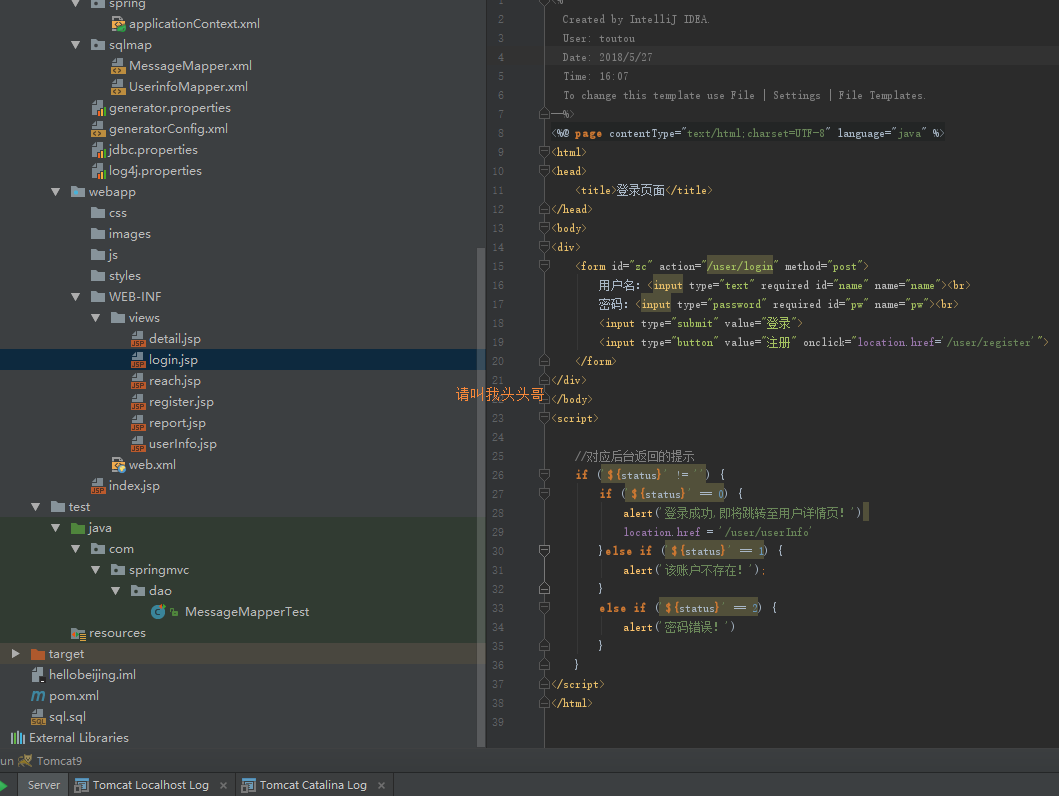
登录
添加userController登录函数

package com.springmvc.controller; import com.springmvc.entity.Userinfo; import com.springmvc.service.UserinfoService; import com.springmvc.util.Encryption; import org.springframework.beans.factory.annotation.Autowired; import org.springframework.stereotype.Controller; import org.springframework.ui.Model; import org.springframework.web.bind.annotation.ModelAttribute; import org.springframework.web.bind.annotation.RequestMapping; import org.springframework.web.bind.annotation.RequestMethod; import javax.servlet.http.HttpSession; import java.util.ArrayList; import java.util.Date; import java.util.List; /** * Created by toutou on 2018/5/27. */ @Controller public class userController { @Autowired private UserinfoService userService; @RequestMapping(value="/user/login", method = RequestMethod.GET) public String login() { return "login"; } @RequestMapping(value = "/user/login", method = RequestMethod.POST) public String loginValidate(HttpSession session, Model model, @ModelAttribute Userinfo user) { List<Userinfo> list = new ArrayList<Userinfo>(); Userinfo record = new Userinfo(); record.setName(user.getName()); list = userService.selectSelective(record); if (list.size() == 0) { model.addAttribute("status", 1); } else { record.setPw(Encryption.MD5(user.getPw())); list = userService.selectSelective(record); if (list.size() == 0) { model.addAttribute("status", 2); } record = list.get(0); session.setAttribute("userinfo", record); model.addAttribute("status", 0); } return "login"; } }
添加登录页面login.jsp

<%-- Created by IntelliJ IDEA. User: toutou Date: 2018/5/27 Time: 16:07 To change this template use File | Settings | File Templates. --%> <%@ page contentType="text/html;charset=UTF-8" language="java" %> <html> <head> <title>登录页面</title> </head> <body> <div> <form id="zc" action="/user/login" method="post"> 用户名:<input type="text" required id="name" name="name"><br> 密码:<input type="password" required id="pw" name="pw"><br> <input type="submit" value="登录"> <input type="button" value="注册" onclick="location.href='/user/register'"> </form> </div> </body> <script> //对应后台返回的提示 if ('${status}' != '') { if ('${status}' == 0) { alert('登录成功,即将跳转至用户详情页!') location.href = '/user/userInfo' }else if ('${status}' == 1) { alert('该账户不存在!'); } else if ('${status}' == 2) { alert('密码错误!') } } </script> </html>
添加userControlle个人中心函数

@RequestMapping(value="/user/userInfo", method = RequestMethod.GET) public String userInfo(Model model, HttpSession session) { Userinfo user = (Userinfo) session.getAttribute("userinfo"); if(user != null){ model.addAttribute("user", user); } return "userInfo"; }
添加个人中心页面userInfo.jsp

<%@ taglib prefix="c" uri="http://java.sun.com/jsp/jstl/core" %> <%-- Created by IntelliJ IDEA. User: toutou Date: 2018/5/27 Time: 22:09 To change this template use File | Settings | File Templates. --%> <%@ page contentType="text/html;charset=UTF-8" language="java" %> <html> <head> <title>个人中心</title> </head> <body> <div> <c:if test="${not empty user}"> <div>欢迎您,${user.name}${user.sex?'女士':'先生'} <a href="/user/logout">注销</a></div></div> </c:if> <c:if test="${ empty user}"> 对不起,请先<a href="/user/login">登录</a> </c:if> </div> </body> </html>
注销

@RequestMapping(value = "/user/logout", method = RequestMethod.GET) public String logout(HttpSession session) { session.invalidate(); //session.removeAttribute("user"); return "login"; }
v源码地址
https://github.com/toutouge/javademosecond/tree/master/hellobeijing
v博客总结
关于《详解intellij idea 搭建SSM框架》共分为上下两集,大概就介绍这么多了,每个功能(操作)都是尽量介绍到最细节,如有遗漏欢迎补充。
作 者:请叫我头头哥
出 处:http://www.cnblogs.com/toutou/
关于作者:专注于基础平台的项目开发。如有问题或建议,请多多赐教!
版权声明:本文版权归作者和博客园共有,欢迎转载,但未经作者同意必须保留此段声明,且在文章页面明显位置给出原文链接。
特此声明:所有评论和私信都会在第一时间回复。也欢迎园子的大大们指正错误,共同进步。或者直接私信我
声援博主:如果您觉得文章对您有帮助,可以点击文章右下角【推荐】一下。您的鼓励是作者坚持原创和持续写作的最大动力!






 浙公网安备 33010602011771号
浙公网安备 33010602011771号